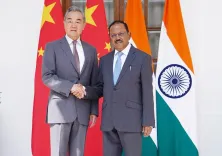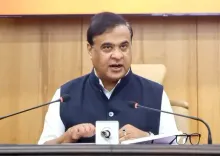Has India’s Position Been Confirmed by Pakistan's Latest IMF Shortcomings?

Synopsis
Key Takeaways
- Pakistan missed three out of five IMF targets.
- Fiscal challenges including revenue shortfalls persist.
- India's opposition to IMF loans highlights security concerns.
- The military's role in the economy poses risks.
- Repeated bailouts raise questions about Pakistan’s financial governance.
New Delhi, Aug 13 (NationPress) As Pakistan once again falls short of meeting three out of five stipulated criteria set by the International Monetary Fund for the second review of the $7 billion bailout package, India’s position is further validated. Islamabad has a longstanding history of being a recurring borrower with a notably poor record of compliance with the IMF's program conditions.
The Federal Board of Revenue of Pakistan did not meet two significant fiscal benchmarks, failing to gather 12.3 lakh crore rupees in total revenue and to generate 50 billion rupees through the much-publicized Tajir Dost Scheme aimed at taxing retailers. Reports indicate that this scheme has not lived up to expectations, leaving the unregulated economy untouched, as mentioned in the Express Tribune.
Furthermore, a fiscal operations summary released by Pakistan’s Ministry of Finance reveals that the provinces did not manage to save the targeted 1.2 lakh crore rupees in the last fiscal year, ending in June, due to increased expenses.
India has consistently opposed loans to Pakistan, arguing that funds from international financial institutions like the IMF could be misappropriated for military purposes and state-sponsored cross-border terrorism. However, the IMF’s actions are constrained by procedural and technical requirements.
“This gap underscores the critical need for moral considerations to be reflected in the processes of global financial institutions,” stated India’s representative Parameswaran Iyer in the recent IMF meeting.
In September, the IMF's Executive Board sanctioned a 37-month Extended Arrangement under the EFF for Pakistan, amounting to SDR 5,320 million (around $7 billion). An initial disbursement of $1 billion was made, while the recent meeting was convened to assess the funding program.
He emphasized that Pakistan has repeatedly borrowed from the IMF, demonstrating a notably poor adherence to the IMF’s program requirements.
India asserts that had previous programs successfully established a sound macroeconomic policy environment, Pakistan would not have needed yet another bailout. This track record raises questions about either the effectiveness of the IMF’s program designs in relation to Pakistan or the oversight and execution by Pakistan.
The military's entrenched involvement in Pakistan’s economic affairs poses substantial risks of policy lapses and reversals of reforms. Even with a civilian government currently in power, the army maintains a significant influence in domestic politics and extends its reach into the economy.
A 2021 UN report characterized military-affiliated businesses as the “largest conglomerate in Pakistan.” The situation has not improved; in fact, the Pakistan Army now plays a prominent role in the Special Investment Facilitation Council of Pakistan.
India has flagged the Pakistan section of the IMF Report on Evaluation of Prolonged Use of IMF Resources. This report highlights a prevalent belief that political factors significantly influence IMF lending to Pakistan. Due to repeated bailouts, Pakistan’s debt burden is exceedingly high, rendering it a too-big-to-fail debtor for the IMF.








